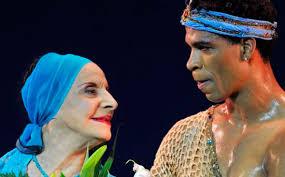
Orishas – Representing the Elements of Nature:
Orishas form the basis of Afro-Cuban dancing. They heavily influenced the evolution of Cuban folklore dancing. For many Cubans, Orishas are much more than just a dance; it’s a religion and a culture. Orishas are the Yoruba/Santeria religion’s gods. Each of these gods looks a certain way, with a story and a character. Religious ceremonies are a Cuban spectacle as the practitioners attempt to portray them through dance.
In addition to the story behind each Orisha, nine have a unique dance corresponding to their own musical incantation, accompanied by special drumbeats played on the Batá.
The Orishas’ dance is an interesting one; it challenges one’s body to move in non-trivial ways. Once connected to the rhythm, one can almost feel the divine connection.
Today, the Orishas have become a fantastic display of colour and history and a portrait of life itself. In this class, you will be guided through steps, generic movements, body isolations and character traits that, in modern Hollywood, would be portrayed as the superheroes themselves.
In these classes, you will be instructed on the following topics:
- An introduction to Orishas
- Musicality
- Coordinating Orisha’s body movements, such as bounce, chest, and arms
- Basics of Eleggua
- Learning the basic steps and a short routine for Oyá
- Learning the basic steps and a short routine for Oggun
- Creating combinations with the Orishas
- Reviewing and combining the routines of the three Orishas.
Luanda Pa
From Cuba, Luanda comes from a legendary dance family in Havana. Her mum Rosa Baquero was the artistic director and choreographer of the famous Cabaret “Parisien & Tropicana de Cuba”, and her dad is the legendary Afro-Cuban dance Maestro Domingo Pau.
Before starting her dance career, Luanda was in athletics. In 1991 she began her studies at the National School of Arts, where she remained until 1994. Later she entered the renowned National Folkloric Ballet of Cuba (NFBC), where she danced as a soloist and principal dancer. She is a master in the role of Oya and Yemayá. She was also a solo dancer in the cabaret show at the Casino de Montecarlo in Monaco.
She graduated with a bachelor’s in cultural activities and sports & education and has an extensive history working with children and adults as an independent dance teacher.
With Luanda, you will get over 40 years of experience wrapped up in one 1-hour class that will entail a combination of all traditional Afro-Cuban dance styles. She is a passionate teacher who makes sure her students develop versatility, strength, endurance, and coordination of body movements while, at the same time, having a lot of fun.
Join the Spring Dance Club and save 43% on all tickets
Spring Dance Club Membership | One off payment of £60.00
Already a member? Log in to apply discount
Tickets
| Ticket Type | Date | Time |
|---|
What to wear & ADF studio rules:
- Please remember that there will be rehearsals and another class in the studio outside your scheduled rehearsal/class, so please make sure everything is cleared away each day before leaving.
- Please don’t leave anything in the studios when you are not there.
- The attire for the Orishas classes should be loose and comfortable to allow a full range of movement. We also recommend wearing ballet slippers (demi-pointe ballet shoes). Socks are not allowed. Ladies can also wear long dance skirts. No outdoor shoes or trainers when rehearsing are to be worn in the studios. Either ballet shoes or bare feet are acceptable (unless otherwise stated).
- You cannot use any electrical equipment onsite unless our technical team has first checked it, there is equipment in the studio to play music etc.
- Please don’t put anything on the piano or the fireplace (studios 1& 2). Do not move or sit on the piano.
- No food or drink is allowed in the studios, except water in plastic bottles with a secure cap.
- No high heels are allowed.
- No smoking.
- No rosin. No talcum powder.
- When leaving, turn off all sound equipment and lights.
If you find a rehearsal area is in a condition that is cause for concern, i.e. damaged or needs cleaning, please report this to the reception or a member of the ADC staff.

